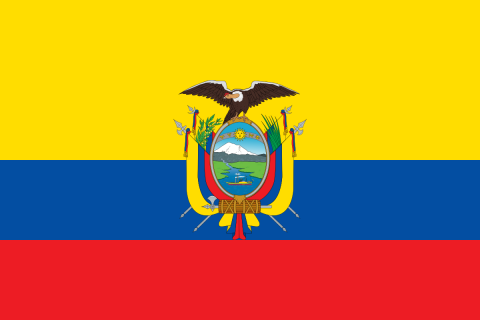
Ecuador
Overview and role of the EITI
Ecuador was admitted as an EITI implementing country in October 2020. The government aims to use the EITI platform to strengthen the governance of state-owned extractive companies and to support the improvement of legal frameworks regulating the sector. By building standards of transparency and accountability, EITI implementation will also help to promote investments in Ecuador's extractive sector and strengthen domestic resource mobilisation.
While Ecuador has made progress in the publication of data on the hydrocarbons sector, there are still asymmetries between the extractive companies, the public sector and citizens in accessing information. For instance, data on the administration of the extractive industries must be contextualised and consolidated in an accessible, open and usable format for all stakeholders.
Economic contribution of the extractive industries
- 37.9%
- to exports
- 9.3%
- to GDP
- 27.1%
- to government revenues
- 0.4%
- to employment
I reaffirm the relevance and need for this nation to be part of this global standard of transparency, which is why we are moving forward with full determination towards its implementation, and with the purpose of successfully achieving our objectives.
Extractive sector management
Tax and legal framework
According to Ecuador’s Constitution (Article 261), the central government has exclusive authority over economic, tax, customs, tariff, fiscal and monetary policies, foreign trade and debt, protected natural areas and natural resources, energy resources, minerals, hydrocarbons, water, biodiversity and forest resources, and the control and administration of national public enterprises. Ecuador’s oil and gas sector is governed by the Hydrocarbons Law, which establishes that the oil and gas sector should be managed to the benefit of Ecuadorian citizens. The mining sector is governed by the Mining Law.
Licenses and contracts
Oil and gas exploration, exploitation and production licenses are granted through a bidding process and awarded by the Ministry of Energy and Non-Renewable Natural Resources. The regularisation of hydrocarbon activities is carried out through the execution of contracts between the government and qualified companies.
Regarding mining rights, the government may delegate its participation in the mining sector to mining companies in which it has a majority interest or to private companies, in accordance with the Mining Law. The Mining Law (Article 17) recognises mining rights as those arising from mining concession titles, mining exploitation contracts, licenses and permits, as well as from authorisations to install and operate processing, smelting and refining plants, and from marketing licenses.
Several mining and oil and gas contracts are disclosed via the EITI Ecuador website and resourcecontracts.org.
EITI implementation
Governance
EITI Ecuador is administered by the Multi-Stakeholder Group (MSG). The MSG is hosted by the Ministry of Energy and Non-Renewable Natural Resources and chaired by the Vice-Minister of Mines.
Timeline
Government announces commitment to join the EITI
Multi-stakeholder group is formed
Candidature application is submitted
Application
Ecuador joined
2020-2022 EITI Report published
Report






